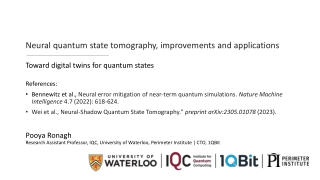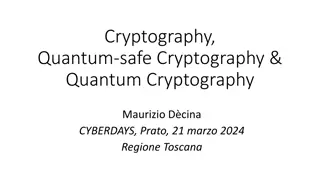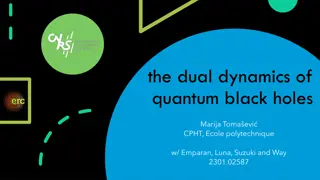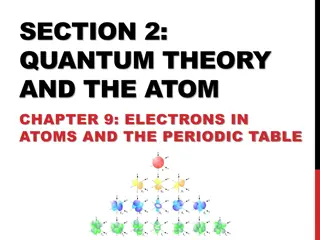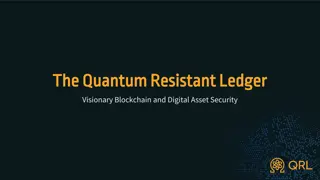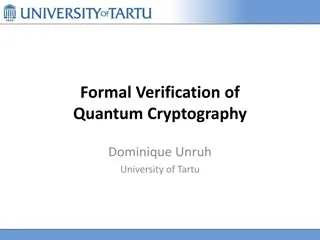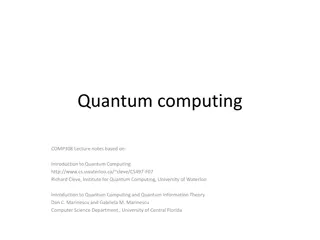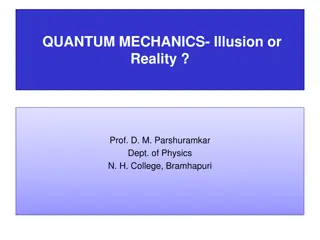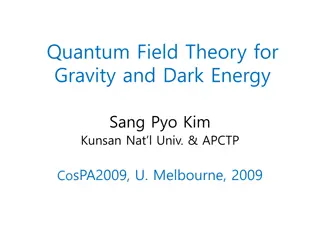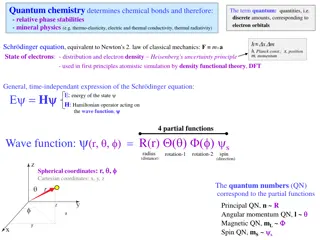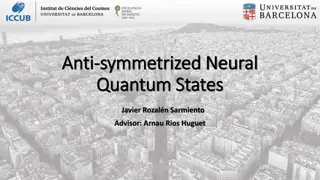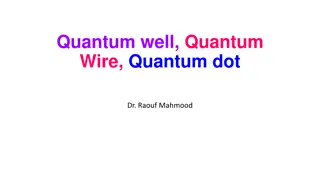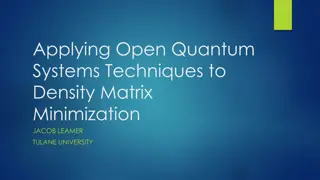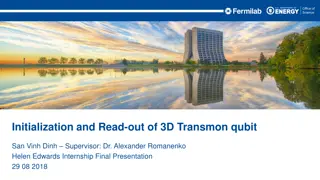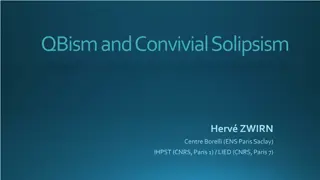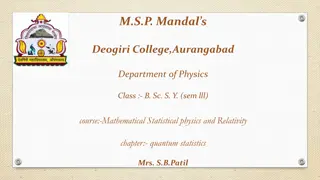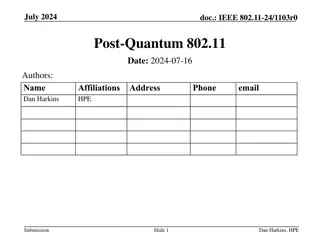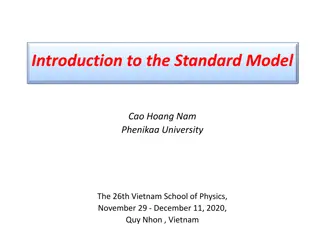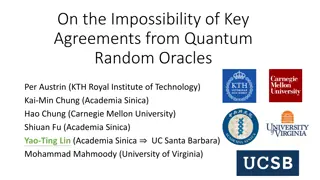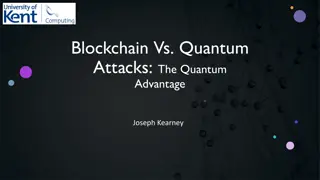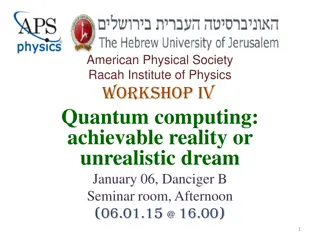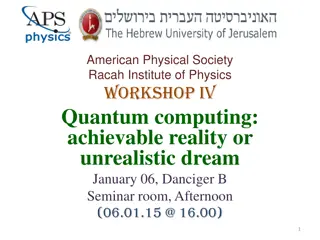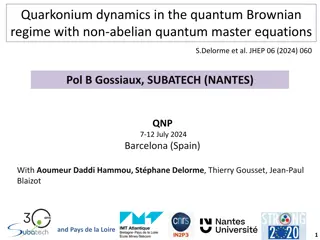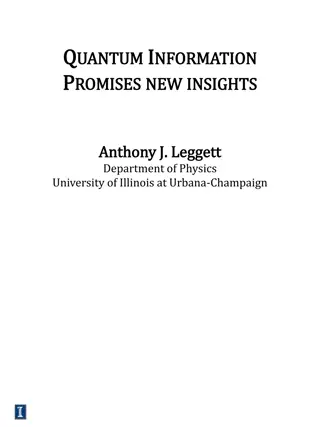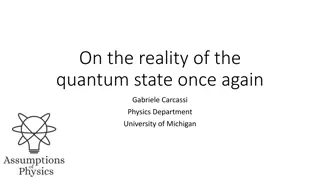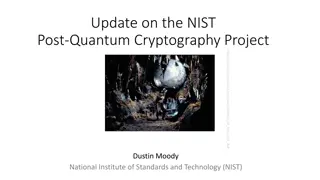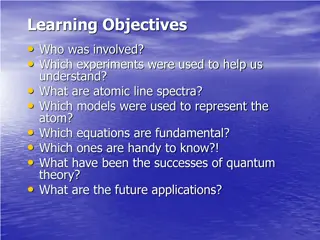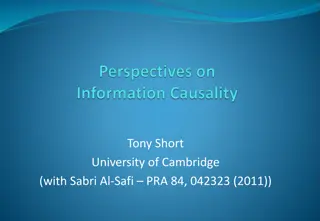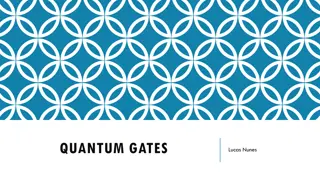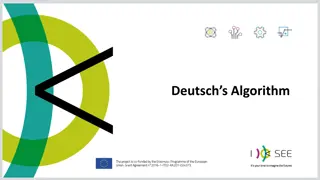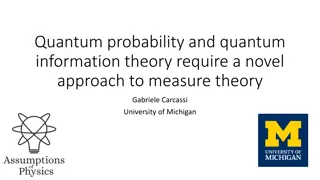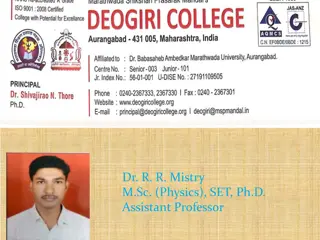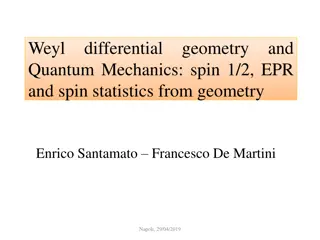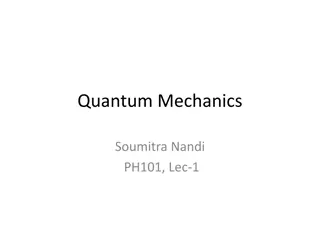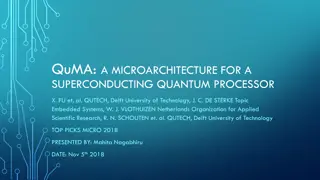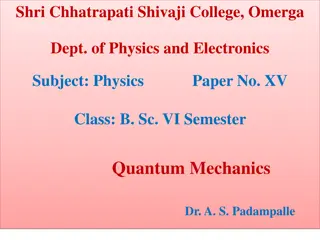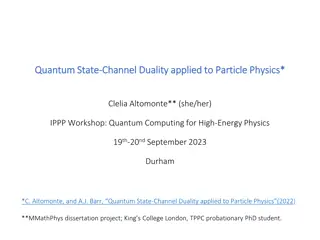Neural quantum state tomography, improvements and applications
Advancements and potential applications of neural quantum state tomography, aiming to reduce the exponential classical memory required for expressing quantum states. It discusses the benefits of using machine learning techniques to process and analyze quantum data, such as cleaning up states, manipu
4 views • 26 slides
Cryptography,.Quantum-safe Cryptography& Quantum Cryptography
Dive into the world of cryptography, quantum-safe cryptography, and quantum technology as discussed in Maurizio D. Cina's presentation at CYBERDAYS in Prato. Topics include current cryptosystems, post-quantum cryptography, quantum key distribution, and future cryptosystems based on quantum algorithm
3 views • 17 slides
CERN Quantum Technologies Initiative Overview
The CERN Quantum Technologies Initiative (QTI) aims to explore the impact of quantum technology on CERN's physics programs. This phase involves identifying key areas for collaboration, conducting scientific investigations, and building quantum capacity. The strategy and roadmap were developed with i
6 views • 14 slides
Exploring Quantum Black Holes: Dual Dynamics and Brane Evaporation
Exploring the dual dynamics of quantum black holes reveals new perspectives on black hole evaporation. By placing black holes on branes, we can study their classical picture in higher dimensions. This approach provides insights that were previously unattainable, leading to a better understanding of
1 views • 28 slides
Exploring Quantum Theory and the Atom: Electrons in Atoms and the Periodic Table
Delve into the fascinating world of quantum theory and the atom in Chapter 9, where we compare Bohr's model with the quantum mechanical model. Understand de Broglie's wave-particle duality and Heisenberg's uncertainty principle's impact on our current electron view. Discover the relationships among
0 views • 31 slides
Addressing The Quantum Threat: The Quantum Resistant Ledger
The Quantum Resistant Ledger (QRL) is a visionary blockchain and digital asset security solution designed to counter the emerging threat of quantum computing. With quantum technology advancing and traditional blockchains at risk, QRL offers an industrial-grade, quantum computer-resistant cryptocurre
2 views • 9 slides
Formal Verification of Quantum Cryptography by Dominique Unruh
Explore the significance of formal verification in quantum cryptography as discussed by Dominique Unruh from the University of Tartu. Understand the challenges, motivations, and current work in verifying quantum crypto protocols, and the potential impact of quantum computers on common encryption met
0 views • 25 slides
Introduction to Quantum Computing: Exploring the Future of Information Processing
Quantum computing revolutionizes information processing by leveraging quantum mechanics principles, enabling faster algorithms and secure code systems. Advancements in quantum information theory promise efficient distributed systems and combinatorial problem-solving. Discover the evolution of quantu
0 views • 68 slides
Near-Optimal Quantum Algorithms for String Problems - Summary and Insights
Near-Optimal Quantum Algorithms for String Problems by Ce Jin and Shyan Akmal presents groundbreaking research on string problem solutions using quantum algorithms. The study delves into various key topics such as Combinatorial Pattern Matching, Basic String Problems, Quantum Black-box Model, and mo
0 views • 25 slides
Exploring Quantum Mechanics: Illusion or Reality?
Delve into the fascinating realm of quantum mechanics with Prof. D. M. Parshuramkar as he discusses the contrast between classical and quantum mechanics. Discover how classical mechanics fails to predict the behavior of electrons in atoms and molecules, leading to the development of quantum mechanic
0 views • 70 slides
Exploring Quantum Field Theory for Gravity and Dark Energy
Delve into the fascinating realms of quantum field theory as applied to gravity and dark energy, unraveling the mysteries of the universe through concepts like vacuum energy, cosmological constants, and dark energy models. Discover the interconnected web of theories concerning the early universe, in
0 views • 27 slides
Understanding Quantum Chemistry and Electron Orbitals
Quantum chemistry plays a key role in determining chemical bonds, phase stabilities, and mineral physics through the study of electron orbitals, quantum numbers, and energy levels. This involves concepts such as the Schrödinger equation, quantum quantities, and the uncertainty principle. The arrang
0 views • 31 slides
Exploring Neural Quantum States and Symmetries in Quantum Mechanics
This article delves into the intricacies of anti-symmetrized neural quantum states and the application of neural networks in solving for the ground-state wave function of atomic nuclei. It discusses the setup using the Rayleigh-Ritz variational principle, neural quantum states (NQSs), variational pa
0 views • 15 slides
Evolution of Light Theory: From Wave Theory to Quantum Theory
At the turn of the century, the discovery of the photoelectric effect challenged the wave theory of light, leading to the development of the quantum theory by Max Planck and Albert Einstein. This new theory introduced the concept of discrete energy units known as quanta, bridging the gap between wav
1 views • 62 slides
Understanding Quantum Wires and Nanowires: Properties and Applications
Quantum wires, quantum dots, and nanowires are essential components in nanotechnology due to their unique properties and applications. Quantum wires are one-dimensional systems with restricted electron movement, while quantum dots are zero-dimensional, limiting electron movement in all dimensions. N
3 views • 12 slides
Advancements in Quantum Systems Techniques for Density Matrix Minimization
Discover the innovative methods and applications of open quantum systems techniques for density matrix minimization. Explore the motivation behind the research, early developments, purification processes, linear scaling potentials, Bloch's method intricacies, quantum channel algorithms, canonical de
0 views • 22 slides
Exploring 3D Transmon Qubits in Quantum Computing
This document delves into the initialization, read-out, and measurement techniques of 3D transmon qubits as integral components of quantum computing. It covers the underlying principles of superconducting qubits, SRF cavity utilization, and the roadmap for improving quantum memory and coherence time
0 views • 12 slides
QBism and Convivial Solipsism in Quantum Interpretations
QBism and Convivial Solipsism present different interpretations of quantum mechanics, focusing on the subjective nature of probabilities and experiences within the quantum formalism. QBism emphasizes the subjective interpretation of probability, considering the quantum state as a tool for assigning
0 views • 30 slides
Development of Quantum Statistics in Quantum Mechanics
The development of quantum statistics plays a crucial role in understanding systems with a large number of identical particles. Symmetric and anti-symmetric wave functions are key concepts in quantum statistics, leading to the formulation of Bose-Einstein Statistics for bosons and Fermi-Dirac Statis
1 views • 15 slides
Post-Quantum Cryptography in IEEE 802.11 - Current State and Future Concerns
Submission discusses the potential impact of post-quantum algorithms on IEEE 802.11 networks, highlighting the necessity to prepare for a post-quantum future. It explores the risks posed by quantum computing to existing cryptographic systems and emphasizes the importance of adopting post-quantum sol
0 views • 19 slides
Understanding the Standard Model of Physics
Delve into the world of quantum field theory, gauge symmetry, Higgs mechanism, electroweak theory, and more with this detailed overview of the Standard Model. Explore classical mechanics, Noether's theorem, relativistic mechanics, quantum mechanics, and quantum field theory concepts. Discover how th
1 views • 21 slides
Quantum Key Agreements and Random Oracles
This academic paper explores the impossibility of achieving key agreements using quantum random oracles, discussing the challenges and limitations in quantum communication, cryptographic protocols, quantum computation, and classical communication. The study delves into the implications of quantum ra
0 views • 29 slides
Understanding Blockchain Vulnerabilities to Quantum Attacks
Explore the vulnerabilities of blockchains to quantum attacks and the potential impact of quantum devices on blockchain technologies. Learn about key concepts such as blockchain basics, proof-of-work, quantum computing, quantum computing algorithms, and vulnerabilities like ECDSA and peer-to-peer ne
0 views • 23 slides
Quantum Computing: Achievable Reality or Unrealistic Dream Workshop
Explore the intriguing realm of quantum computing through insightful lectures by Prof. Gil Kalai and Prof. Nadav Katz at the American Physical Society workshop. Delve into the possibilities, failures, and advancements in quantum information science. Join the discussion on the state-of-the-art develo
0 views • 13 slides
Insights on Quantum Computing: Bridging Theory and Reality
Delve into the world of quantum computing through a series of workshops and personal reflections. Explore the intersection of theoretical concepts with practical applications, highlighting the evolving landscape of quantum mechanics. The journey navigates discussions on electron spin, fundamental th
0 views • 12 slides
Quantum Brownian Regime in Quarkonium Dynamics: Insights and Applications
Exploring quarkonium dynamics in the quantum Brownian regime using non-abelian quantum master equations reveals crucial aspects such as regeneration processes, quarkonia at finite temperature, and distinct regimes based on spectral density and dissociation mechanisms. The study delves into quantum m
0 views • 44 slides
Exploring Quantum Information through Polarization of Photons
Quantum information and photon polarization are explored in this detailed presentation featuring the ultimate quantum 2-state system. The content delves into the behavior of single photons at a quantum level, showcasing the intriguing properties and implications of quantum superposition in polarizat
1 views • 14 slides
Exploring Quantum State Reality by Gabriele Carcassi at University of Michigan
Gabriele Carcassi from the Physics Department at the University of Michigan delves into the intricacies of quantum state reality, challenging ontic models' compatibility with quantum mechanics and the limitations of measure theory in reproducing quantum probability and information theory.
0 views • 28 slides
Understanding Quantum Computing and Its Impact on Cryptography
Quantum computing utilizes the principles of quantum mechanics to process information exponentially faster than classical computers. This advancement poses a significant threat to current cryptographic systems, especially those reliant on factors like RSA and Diffie-Hellman key exchange. If large-sc
0 views • 25 slides
Quantum Theory and Key Figures in Physics
Explore the evolution of quantum theory through the perspectives of renowned physicists such as Albert Einstein, Niels Bohr, Werner Heisenberg, Erwin Schrödinger, Prince Louis de Broglie, and Max Planck. Learn about atomic line spectra, fundamental equations, and models used to represent the atom.
0 views • 23 slides
Exploring Quantum Information Theory and Correlations
Understand the capabilities of quantum theory compared to other potential theories, such as classical and general box-world scenarios. Dive into concepts like the CHSH game, local classical correlations, PR-boxes, and information causality to enhance your grasp on quantum applications and non-local
0 views • 27 slides
Understanding Quantum Computing: Quantum Gates, Bits, and Applications
Explore the world of quantum computing with this detailed guide covering quantum bits, gates, their applications, and the advancements made in the field. From classical bits to qubits, Bell states, and quantum gates, discover the fundamental principles that drive quantum computing forward.
0 views • 37 slides
Understanding Deutsch's Algorithm in Quantum Computing
Deutsch's Algorithm is a fundamental quantum algorithm designed to solve the problem of determining if a given function is constant or balanced. This algorithm leverages quantum principles such as superposition and entanglement to provide a more efficient solution compared to classical methods. By e
0 views • 17 slides
Exploring Quantum Probability and Information Theory
Quantum probability and information theory challenge traditional measure theory, leading to a project aiming to derive fundamental physical assumptions from first principles. Gabriele Carcassi from the University of Michigan leads this endeavor, investigating the logical structures of classical and
0 views • 19 slides
Understanding Classical Mechanics and Quantum Theory: A Comprehensive Overview
Explore the fundamental principles of classical mechanics and quantum theory through the insightful teachings of Dr. R. R. Mistry. From the mechanics of particles to the wave-particle duality, delve into topics such as conservation laws, Schrodinger's equation, and the origins of quantum theory. Gai
0 views • 22 slides
Quantum Mechanics and Geometric Interpretations in Weyl Space
The discussion explores Weyl quantum mechanics, Bohm's interpretation of quantum potential, and geometric formulations in Euclidean-Weyl space. It delves into the implications of nonlocal quantum potentials and the nature of metric spaces in shaping quantum phenomena. Concluding with alternative vie
0 views • 30 slides
Exploring Quantum Mechanics: Unveiling the Mystery of the Subatomic World
Quantum mechanics, the fundamental theory of atomic phenomena, reveals a bizarre yet fascinating world where particles exhibit wave-particle duality and probabilities rule. This theory, beyond direct human perception, explains behaviors in various materials and technologies, paving the way for quant
0 views • 8 slides
Overview of QuMA: A Microarchitecture for a Superconducting Quantum Processor
This paper introduces QuMA, a quantum microarchitecture that bridges the gap between high-level algorithms and the quantum physical layer. It defines a multi-layered system stack for quantum computers, focusing on compiler support, quantum error correction, and the need for a micro-architecture fram
0 views • 21 slides
Unveiling the Quantum World: Understanding Blackbody Radiation and Quantum Mechanics
Quantum Mechanics emerged between 1900 and 1930 as a revolutionary theory explaining the behavior of microscopic particles. This article delves into the need for Quantum Physics due to classical mechanics' limitations, focusing on Blackbody Radiation and laws governing it like Wiens Displacement Law
0 views • 30 slides
Exploring State-Channel Duality in Quantum Physics for High-Energy Colliders
Delve into the intriguing concept of State-Channel Duality in quantum information theory applied to high-energy particle physics processes. Discover how quantum channels connect density matrices of particle physics states and their implications for future colliders and quantum computing implementati
0 views • 26 slides
